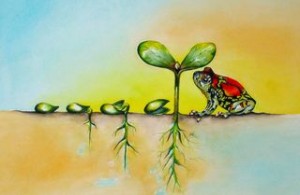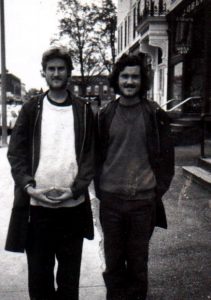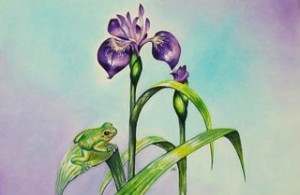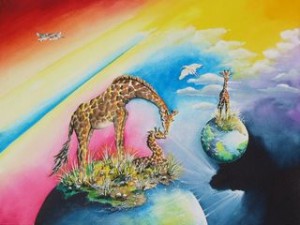The Art of Disobedience
By Dr. Will Tuttle
“Disobedience is the true foundation of liberty. The obedient must be slaves.” – Henry David Thoreau
From the time we’re infants, we are continuously pressured to obey, conform, and be pleasing to others and to authorities. When we do this well, we may get our rewards in social approval, and if we don’t, we may suffer the consequences. The problem is that if we are merely an obedient product of our social conditioning, we disconnect ourselves from our inner wisdom, creativity, and the unique individual expression that we are born to discover and celebrate in this life.
From a cultural perspective, how can we fulfill our potential and how can our society evolve, if we never question the pervasive socially-imposed narratives, especially those that are harmful or limiting? Learning and practicing the art of disobeying counterproductive social narratives, especially if they’re internalized, can open doorways to both personal and planetary healing and transformation. These are urgent issues, calling us to contribute to awakening from our current mass hypnosis.
 As an example, I remember going through a tumultuous period during my college years in the early 1970s and beginning seriously to question internalized social norms. I am grateful that I did, and that there were some role models for inspiration. Contemplating the Vietnam War and its consequences led me to start defying inner taboos against questioning the morality of my nation-tribe and its leaders, and against exploring and embracing what were considered radical or un-American views in politics, economics, religion, and ethics.
As an example, I remember going through a tumultuous period during my college years in the early 1970s and beginning seriously to question internalized social norms. I am grateful that I did, and that there were some role models for inspiration. Contemplating the Vietnam War and its consequences led me to start defying inner taboos against questioning the morality of my nation-tribe and its leaders, and against exploring and embracing what were considered radical or un-American views in politics, economics, religion, and ethics.
One poignant example of this was that in my senior year I finally realized how I had allowed myself to become a virtual slave to the academic rewards system of grading. Since early childhood I had worked hard to achieve excellent grades, and it had served well in terms of getting parental approval and admission into a respected college. Yet I suddenly felt the painful shallowness and even the dishonesty of studying to perform well in examinations just to game the system in my favor. Where would it end?
I rebelled internally and still remember vividly the final exam for my Organizational Behavior senior seminar, sitting solemnly with all the other students who were diligently beginning to write their answers to the exam questions. Instead, I briefly wrote that I had spent my entire life chasing good grades, that I refused to do so anymore, and that the frozen pond was beckoning me to leave and go skating in the fresh air. I turned in my paper to the professor and can still see his jaw dropping as I went outside and glanced back through the classroom window as he was reading it.
I was of course called in to academic offices of well-meaning authorities warning me that while my solid academic record assured that I would graduate, I was burning my bridges, and it would probably never be possible to go on to graduate school if I let my grades slide like this. I was adamant though, and threw myself into a self-guided exploration in the college library into a beckoning universe of revolutionary and fascinating ideas and lives: Walt Whitman, Thoreau, Wilhelm Reich, Marcuse, Henry Miller, Ram Dass, Zen texts, the Gita, and for action, performing an organ concert, serving as music director of a play, and becoming the managing editor of the Colby Echo, the college newspaper, commenting on and influencing the political and social struggles of campus life.
It was an exhilarating and liberating final semester at Colby, and led in a rather organic way to another act of disobedience, which was to literally walk away from going into the family business. As the oldest child, I had been groomed from birth to inherit and manage The Beacon Publishing Company, started by my father, which comprised a chain of 13 local newspapers in suburban Massachusetts, that he had built up from virtually nothing over the prior two decades. My dad accepted it gracefully, and my younger brother Ed and I left home in September 1975 in what for us was a spiritual pilgrimage west, toward California, where we thought we would find kindred spirits and cosmic consciousness.
 Our walk ended up taking us eventually south to Alabama, and was basically an almost continuous practice of questioning and disobeying many of my acquired inner taboos and some outer ones as well, often by necessity. We had virtually nothing and were walking in faith, meditating and practicing self-inquiry, sleeping wherever we could, and deepening the “Who am I?” question to get to the roots of understanding our true nature, beyond the chatter of our mind’s continual dialog that reinforces the dualistic categories of self and other. I learned to begin to let go of inner narratives of self-protectiveness, and to be more open to the direct experience of the present moment. We found that food and shelter somehow always (perhaps somewhat miraculously) appeared, through helping others, or dumpster diving, or being jailed for vagrancy, or welcomed in by kind people, as we walked the small back-country roads of Pennsylvania, West Virginia, Kentucky, and Tennessee.
Our walk ended up taking us eventually south to Alabama, and was basically an almost continuous practice of questioning and disobeying many of my acquired inner taboos and some outer ones as well, often by necessity. We had virtually nothing and were walking in faith, meditating and practicing self-inquiry, sleeping wherever we could, and deepening the “Who am I?” question to get to the roots of understanding our true nature, beyond the chatter of our mind’s continual dialog that reinforces the dualistic categories of self and other. I learned to begin to let go of inner narratives of self-protectiveness, and to be more open to the direct experience of the present moment. We found that food and shelter somehow always (perhaps somewhat miraculously) appeared, through helping others, or dumpster diving, or being jailed for vagrancy, or welcomed in by kind people, as we walked the small back-country roads of Pennsylvania, West Virginia, Kentucky, and Tennessee.
One lesson that stands out during this time is my decision to disobey the internalized medical edict that I would never be able to see without glasses. Though my vision was fine as a child, in sixth grade I developed a bit of a blur and was diagnosed with mild near-sightedness and fitted with glasses. I didn’t like them but was encouraged to wear them so I could see everything sharply, and as the years went by, and I got contact lenses, the prescriptions kept getting stronger to the point that in college I had 20/200 vision in my better eye, and could barely count fingers with the other eye. Intuitively, about a month into our walk, I felt called to disobey the constant glasses-wearing mandate, and just allowed the world to be a huge blur. Ed became, during these early months, my seeing-eye dog.
It was challenging because of feeling vulnerable, but as I stuck with it over the months and years, my vision began naturally to heal and improve. Spending days walking in the fresh air, feeling exhilarated and grateful to be living my own chosen life and following a deep inner calling, meditating many hours daily, abandoning eating meat, and a few years later going vegan, spending hours studying the principles of healthy vision and doing eye exercises of many kinds, seeking out vision teachers and re-learning the habits of healthy vision, and exploring the powerful truths underlying the ancient wisdom of spiritual healing: all these and other factors poured blessings into my life and vision.
 Because I was willing to disobey the medical orders I had internalized, I received benefits far beyond naturally improving eyesight. My vision gradually improved to 20/40, good enough to pass the driving test, which I’ve done for the past 40 years, but my inner vision also improved. On this deeper level, I discovered that my disability—my blur—was an outer manifestation of the fear at eleven years old of not being accepted by others, and an unconscious yearning to escape from a seemingly more threatening world. The physical glasses from the medical industry addressed only the symptom, not the underlying cause, and forced my vision into continuing deterioration. Never encouraged to look at dis-ease as a symbolic manifestation of a deeper disharmony, with a benevolent purpose—to facilitate emotional healing and bring the light of awareness to the underlying cause—I had been made powerless and dependent upon an industry that had me as a customer for life, with the attendant headaches, discomfort, inconvenience, and ongoing cost of exams and hardware.
Because I was willing to disobey the medical orders I had internalized, I received benefits far beyond naturally improving eyesight. My vision gradually improved to 20/40, good enough to pass the driving test, which I’ve done for the past 40 years, but my inner vision also improved. On this deeper level, I discovered that my disability—my blur—was an outer manifestation of the fear at eleven years old of not being accepted by others, and an unconscious yearning to escape from a seemingly more threatening world. The physical glasses from the medical industry addressed only the symptom, not the underlying cause, and forced my vision into continuing deterioration. Never encouraged to look at dis-ease as a symbolic manifestation of a deeper disharmony, with a benevolent purpose—to facilitate emotional healing and bring the light of awareness to the underlying cause—I had been made powerless and dependent upon an industry that had me as a customer for life, with the attendant headaches, discomfort, inconvenience, and ongoing cost of exams and hardware.
It became clear to me that by constantly suppressing symptoms, western allopathic medicine had blinded me to the gift that the blur was trying to bring to me: to reveal and help me address the underlying emotional woundedness. As I consciously cultivated a deeper understanding of myself not as a mere physical/mental machine that is born and dies, but as eternal consciousness with the inherent capacity of seeing clearly, I realized more clearly that outer manifestations always flow from inner realities. What I am (and all of us are) is the inner reality, not the outer appearance. By disobeying the materialistic medical “laws” I had been indoctrinated to live by, I became freer to obey the deeper and truer universal laws of joy, creativity, and healing.
 After several years living in meditation centers in Alabama and Georgia, I relocated to San Francisco and after a few years decided to apply to graduate school at U.C. Berkeley, but was immediately rejected due to my GPA from Colby not being high enough, as I had been warned. However, with the intervening years of meditation practice and study, I was in many ways a different person, and upon being accepted into a Master’s program at San Francisco State University, I was no longer chasing good grades. Passionately inspired by the love of learning, I naturally received high grades and awards and when I then applied to U. C., Berkeley’s, Ph.D. program, I was immediately accepted, and went on to an unusual 4.0+ GPA at Berkeley with my dissertation being nominated for the Best Dissertation Award. Again, not because I was seeking good grades but rather because I felt aligned with a deeper purpose, and while taking a full course load at Berkeley, also taught a full course load at a local college.
After several years living in meditation centers in Alabama and Georgia, I relocated to San Francisco and after a few years decided to apply to graduate school at U.C. Berkeley, but was immediately rejected due to my GPA from Colby not being high enough, as I had been warned. However, with the intervening years of meditation practice and study, I was in many ways a different person, and upon being accepted into a Master’s program at San Francisco State University, I was no longer chasing good grades. Passionately inspired by the love of learning, I naturally received high grades and awards and when I then applied to U. C., Berkeley’s, Ph.D. program, I was immediately accepted, and went on to an unusual 4.0+ GPA at Berkeley with my dissertation being nominated for the Best Dissertation Award. Again, not because I was seeking good grades but rather because I felt aligned with a deeper purpose, and while taking a full course load at Berkeley, also taught a full course load at a local college.
It’s inspiring to realize how assuredly doors open when we follow what mythologist Joseph Campbell called “our bliss,” our unique calling that brings joy and fulfillment. Through disobeying lower laws and taboos, higher laws can be fulfilled. Obeying the higher law of compassion, I gladly broke the lower indoctrinated laws—based on fear as they usually are—that I must eat animal-sourced foods to get needed nutrition and to fit in, or that I should drink alcohol or take drugs to relax, or that I must conform to be accepted by others.
Over the years, experimenting with the art of disobedience, I’ve been willingly arrested and jailed to show solidarity with people suffering under U.S. military domination, liberated crabs and lobsters from underwater traps, and journeyed to learn about and help make peace with the “evil empire” enemy, the former Soviet Union, through piano concerts there. That led somewhat miraculously to discovering my beloved life-partner, Madeleine, in Switzerland, through which I backpacked and was surreptitiously sleeping in forest-edge sheep bunkers at night, and playing the piano at a local Waldorf school in the evenings. I met her at the school one evening at an unexpected formal-attire art gallery opening. Though I was dressed in shorts, she fortunately resonated with both my music and my free-spirited nature, and we eventually lived on the road in a “rolling tiny house” for twenty years, traveling to all fifty states, and ultimately to fifty countries as well, sharing the vegan message through about four thousand lectures to date. I am honored to have spent nearly three glorious decades now with such a loving and inspiring companion. A thread running through all the many joys and opportunities has been exploring the comfort zone edge, and challenging inner and outer taboos and customs.
 It’s a delicate balance. Cultivating discriminating awareness is essential. Every action has consequences. Though there are certainly times when it may be best to follow the dictates of the medical establishment, or the prevailing political and economic laws and policies, there are clearly times when doing so prevents us from following the higher universal principles that can bring positive and creative transformation into our individual and collective lives.
It’s a delicate balance. Cultivating discriminating awareness is essential. Every action has consequences. Though there are certainly times when it may be best to follow the dictates of the medical establishment, or the prevailing political and economic laws and policies, there are clearly times when doing so prevents us from following the higher universal principles that can bring positive and creative transformation into our individual and collective lives.
From the outside, it may look like disobedience, but from the inside it feels like inner guidance. Saying no to accepted protocols may actually be saying yes to our inner wisdom’s directives, and can help us be a positive force for healing and awakening in our world. Every day we can do our best to break a few rules and to question our inner authorities, disobeying their orders that imprison us in fear and delusion.
A daily practice of meditative inner listening is fundamental to maintaining a reliable foundation of receptive awareness that supports us in living our life authentically in a world that relentlessly sabotages this basic, healthy yearning. Ironically, a helpful ally in practicing this art of disobedience has been for me the regular morning practice for the last 40 years of mindfully reciting and striving to fulfill the Ten Precepts, the Bodhisattva vow, and the Six Paramitas. These are basic rules for living and aspiration that are part of Buddhist training, and may be found at the end of this essay.
During this time of unprecedented medical, political, economic, and social demands for unquestioned obedience, as well as the brutal censorship of alternative narratives, our reasoned disobedience to ill-conceived, reductionistic orders and directives may be an especially valuable gift to others and to ourselves.
The Ten Precepts (Zen tradition)
I undertake the rule of training not to kill but to cherish all life.
I undertake the rule of training not to take what is not given, but to respect the things of others.
I undertake the rule of training not to lie but to speak the truth.
I undertake the rule of training not to engage in improper sexuality but to practice purity of mind and self-restraint.
I undertake the rule of training not to cause others to use liquors or drugs which engender slothfulness, which confuse or weaken the mind, nor to do so myself, but to keep my mind clear.
I undertake the rule of training not to praise myself nor to condemn others, but to overcome my own shortcomings.
I undertake the rule of training not to speak of the misdeeds of others but to be understanding and sympathetic.
I undertake the rule of training not to withhold spiritual or material aid, but to give it freely where needed.
I undertake the rule of training not to become angry, but to exercise loving-kindness and compassion.
I undertake the rule of training not to defame the Three Treasures—the Buddha, the Dharma, and the Sangha—but to cherish and uphold them.
The Bodhisattva Vow (Version by Lama Anagarika Govinda)
Whatever be the highest perfection of the human mind, may I realize it for the benefit of all living beings. Even though I may have to take upon myself all the sufferings of the world, I will not forsake my aim and my fellow creatures in order to win salvation for myself only.
The Six Paramitas (I find this format of one for each day of the week helpful. My wording here.)
Monday, The Day of Giving: Dana Paramita. Let us have all-pervading love, not only for people but for all sentient beings, and give of ourselves and our possessions freely and without regret, with a heart of lovingkindness. Let our giving be rooted in transcendent awareness, knowing the three elements involved are of one essence. Finally, let us remember that the teachings contain no greater wisdom than the wisdom of letting go. This is also called Dana. (Note: the three elements mentioned here are giver, gift, and receiver.)
Tuesday, The Day of Ethics: Sila Paramita. Let us maintain standards of discipline, etiquette, and decorum so that our actions are honorable in every situation, and thinking of others always, let us be careful not to harm them in any way. Let us cultivate the natural integrity, diligence, and straightforwardness that fundamental aspects of clear seeing and real virtue.
Wednesday, The Day of Patience: Kshanti Paramita. Let us treat all beings as the Buddha, seeing through the spell of appearance to the essential reality in which there is no fundamentally separate self. Let us remember that patience is humility, a basic acceptance of this present moment as the perfect unfoldment of life and love, and that it is also an accurate mirror of our present state of mind, and thus continuously bears great opportunities to grow in wisdom and compassion.
Thursday, the Day of Zealous Effort: Virya Paramita. Whatever is appropriate, let us perform it diligently and persistently push forward. Let us be aware of the Source of all energy and activity, and live in harmony with it.
Friday, the Day of Stillness and Stability of Mind: Dhyana Paramita. Let us function in tranquil one-pointedness of mind, free from agitation arising through the senses, and dualistic conceptions of this and that, self and other. Let us let go of tension and separateness, and realize the equanimity that is born of awakening to the truth underlying phenomena.
Saturday, the Day of Wisdom: Prajna Paramita. Let us act so that the mind is always pure and bright, and behave so that we are never uncertain about the rightness of our actions. By the brightness of inherent wisdom, let us dispel the delusion of separateness, and greed and hatred, which spring from ignorance about the real nature of sense objects.
Sunday, the Day of Service: Simultaneous Practice of all the Paramitas. Let us put all forms of wholesome action into practice, by rendering service to others and practicing generosity, loving speech, beneficial action, and cooperativeness. May lovingkindness and compassion emanate from our every thought, word, and deed, and bless all sentient beings, and may they all realize the original brightness of their minds and be instantly reborn in the Pure Land of clear seeing.
Leave a Reply to Susan Daytree Cancel reply